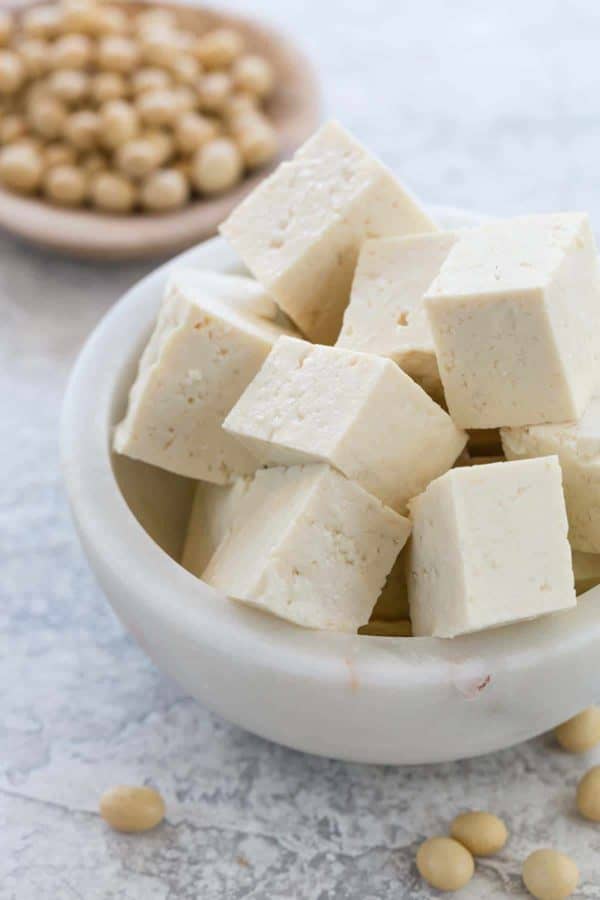Tofu is a highly nutritious food, but it is one of those foods that has sparked debates for decades.
While some people can’t preach enough about the numerous health benefits of tofu, others have declared that it is a genetically-modified poison that must be avoided by all means.
This confusion may leave you wondering whether it will be a mistake for you to eat tofu or not.
This article explores in details the wonderful health benefits of tofu to determine whether or not it is good for you.
What Is Tofu?
Tofu is not a natural food. It is made of condensed soy milk that is made into hard white blocks almost like the process of cheese making. Tofu originated in China and it has become a world wide delicacy.
Rumor has it that one Chinese cook discovered tofu about two millennia ago (2,000 years) when he accidentally mixed a large batch of fresh soy milk with nigari.
Just in case you are wondering what Nigari is, it is what is left after the salt has been extracted from seawater. Nigari is a mineral-rich coagulant that is used to solidify tofu and keep its form.
Most of the soybeans sold around the world are currently grown in the United States, and a very large percentage of it is genetically modified (GMO).
Although GMO foods have been a source of serious controversy, research carried out so far has not yet found them to be harmful to humans.
However, if you feel like you have a problem with GMO, simply make you tofu at home or opt for non-GMO, organic tofu brands.
Contains Many Nutrients
Tofu has a high protein content and also contains all of the vital amino acids that your body needs. Tofu also provides carbs, fats, and a wide range of vitamins and minerals.
A single 3.5-ounce (100-gram) serving of tofu offers you:
- Carbs: 2 grams
- Protein: 8 grams
- Fat: 4 grams
- Fiber: 1 gram
- Calcium: 20% of the RDI
- Copper: 11% of the RDI
- Selenium: 14% of the RDI
- Manganese: 31% of the RDI
- Phosphorus: 12% of the RDI
- Zinc: 6% of the RDI
- Magnesium: 9% of the RDI
- Iron: 9% of the RDI
The above comes with exactly 70 total calories, and that makes tofu a nutrient-dense food.
However, there are different coagulants that can be used in the making of tofu, thus the micronutrient content of tofu vary greatly depending on the coagulant used in its making.
Nigari adds a higher volume of magnesium while precipitated calcium only increases the calcium content of your tofu.
Contains Antinutrients
Just like a lot of plant foods, tofu contains different antinutrients.
These anti-nutrients include;
- Phytates : Phytates can decrease the absorption of minerals, such as zinc, calcium, and iron.
- Trypsin inhibitors : These compounds are known to block trypsin, which is an enzyme needed for the proper digestion of protein.
However, simply soaking or cooking soybeans can help to eliminate or inactivate some of these antinutrients.
Sprouting your soybeans before making tofu with it will reduce phytates by up to 56% and diminish trypsin inhibitors by as much as 81% while also increasing the protein content of your soybeans by up to 13%.
Fermentation is also a wonderful way to reduce antinutrients. This is the very reason reason why fermented, probiotic soy foods — such as miso tempeh, miso, tamari, or natto — are very low in antinutrients.
Do not forget that the antinutrient content of tofu is nothing to be concerned about unless you are deliberately following an imbalanced diet and only relying on tofu as your primary source of zinc or iron.
Tofu contains Beneficial Isoflavones
Soybeans are rich in natural plant compounds known as isoflavones.
These compounds function as phytoestrogens, which meaning that they are capable of attaching to and activating estrogen receptors in your body.
The effects produced by this phytoestrogen is similar to that of the hormone estrogen, but they are weaker.
Tofu contains 20.2–24.7 mg of isoflavones per 3.5-ounce (100-gram) serving.
A large part of the health benefits of tofu are linked to its high isoflavone content.
Tofu Contains Saponins
Also, tofu contains saponins, which are compounds that thought to have protective effects on the heart health.
Studies carried out on animals reveal that saponins can not only improve blood cholesterol, but also increase the disposal of bile acids, both of which will help to lower the risk of heart disease risk.
Tofu May Reduce the Risk of Heart Disease
Only a few research specifically look at tofu’s effects on cardio health.
However, studies have revealed that high consumption of legumes, including soy, is linked to lower rates of cardio disease.
Scientists have also found out that soy isoflavones can help to reduce the inflammation of blood vessel and also improve their elasticity.
One research found out that take 80 mg of isoflavones supplements per day for 3 months (12 weeks) improved the blood flow of people who were at risk of stroke by 68%.
It was also discovered that 50 grams of soy protein daily is also linked with improved levels of blood fats and an estimated 10% less risk of heart disease.
What else is there to know? In postmenopausal women, a high intake of soy isoflavone has been linked to different heart-protective factors, which includes an improvements to waist circumference, body mass index, fasting insulin, and “good” HDL cholesterol.
Tofu is Linked to a Reduced Risk of Some Cancers
Studies have examined the effects of soy products, especially tofu on prostate, breast, and digestive system cancers.
Breast Cancer
Studies revealed that ladies who eat soy products at least one time in a week have as much as 48–56% less risk of breast cancer.
This protective effect against breast cancer is believed to derived from isoflavones, which has also been been revealed to positively influence both the menstrual cycle and blood estrogen levels.
It seems that exposure to soy during childhood and adolescence may be most protective, but that’s not to say that intake later in life is not beneficial.
In fact, studies reveal that women who included more of soy products to their diet at least once in a week throughout their adolescence and adulthood had enjoyed to 24% less risk of breast cancer, compared to individuals who ate soy only during their adolescence alone.
One constant criticism of tofu and many other soy products is that they may likely increase the risk of breast cancer. However, a two-year research that was carried out on postmenopausal women who ate two servings of soy daily failed to identify an increased risk.
Other studies have also reported similar outcomes, including a review of 174 researches, which found no connection between soy isoflavones and an increased breast cancer risk.
Cancers of the Digestive System
One research observed that higher consumption of tofu was connected to a 61% less risk of stomach cancer in men.
Interestingly, a second research revealed a 59% less risk in women.
What’s else? a recent review of different studies in 633,476 individuals linked higher intake of soy or tofu to a 7% lower risk of cancers of the digestive system.
Prostate Cancer
Two review studies revealed that men who consumed higher amounts of soy, most specifical tofu, had as much as 32–51% lesser risk of prostate cancer.
A third review also confirmed these findings but included that the goodness of isoflavones may greatly depend on the amount consumed by a person and the type of gut bacteria that is present.
Tofu May Reduce Your Risk of Diabetes
Several test-tube studies carried out recently and animal studies reveal that soy isoflavones may help to boost blood sugar control.
In one research of healthy postmenopausal females, 100 mg of soy isoflavones daily reduced their blood sugar levels by 15% as well as insulin levels by 23%.
For postmenopausal women who have diabetes, taking 30 grams of isolated soy protein as supplement lowered the fasting insulin levels by 8.1%, “bad” LDL cholesterol by 7.1%, total cholesterol by 4.1%, and insulin resistance by 6.5%.
In a different study, taking isoflavones every day for an entire year improved blood fats and insulin sensitivity while reducing the risk of heart disease.
However, the above findings are not universal. In another review of 24 human studies, it was discovered that soy protein that is intact — as opposed to protein extracts or isoflavone supplements — was a lot more likely to lower blood sugar levels.
Therefore, there is need for more studies.
Other Potential Benefits of tofu
Due to the high isoflavone content of tofu, it may also be good for:
- Bone health: Some scientific data have Suggested that 80 mg of soy isoflavones daily may help reduce bone loss, especially during the early stages of menopause.
- Brain function: Studies also reveal they soy isoflavones may have a good influence on brain function and memory, especially for women who are over 65 years of age.
- Menopause symptoms: Soy isoflavones may be helpful in the reduction of hot flashes. However, this has not been agreed by all studies.
- Skin elasticity: This may be one reason why women will love tofu. Taking as much as 40 mg of soy isoflavones daily can reduce wrinkles significantly and improve skin elasticity after 2-3 weeks.
- Weight loss: In one research, taking soy isoflavones for 2–6 months resulted in an average weight loss of up to 10 pounds more than the control group.
Tofu May Cause Problems for Some People
While it is considered safe to eat tofu and some other soy foods daily. That said, you may need to be moderate about your tofu consumption if you have:
- Breast tumors: Due to the weak hormonal effects of tofu, some doctors advice women with breast tumors that are estrogen-sensitive to limit their soy intake.
- Thyroid issues: Some doctors also advise people who have poor thyroid function to avoid tofu and other soy foods due to its goitrogen content.
However, in a recent report from the European Food Safety Authority (EFSA) they reached a conclusion that soy and soy isoflavones should not be a bother or reason for concerns for breast and uterine cancers or thyroid function.
Nevertheless, studies agree that babies shouldn’t be fed with soy isoflavones as if may disrupt the healthy development of their reproductive organs.
Although there is yet to be enough human studies on this subject, some animal studies have suggested that the intake of high amounts of tofu or soy may interfere with fertility.
If you have any concerns about tofu consumption, discuss soy and your health with your doctor.
Tofu varieties and ways of Preparation
You can purchase tofu in bulk or in individual packages, either refrigerated or not.
It is also possible for you to find it freeze-dried, dehydrated, jarred, or canned.
Generally, there is no need for heavy processing to make tofu, so it is best that you choose varieties with very short ingredients lists.
When checking out the ingredient list you should expect to see only ingredients such as water, soybeans, and coagulants — like calcium sulfate, delta gluconolactone or magnesium chloride, — and maybe some seasoning.
If you’re not comfortable with buying tofu from the store, you can make yours at home with soy milk, lemon juice, and some water.
You can enjoy your tofu as a snack or part of a dish. There are lots of delicious tofu recipes you may want to try as well.









